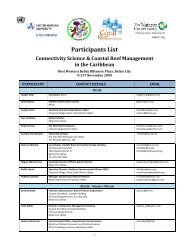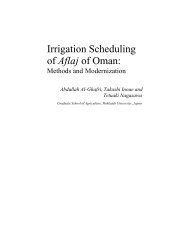The Global Water Crisis: Addressing an Urgent Security - Unu-inweh ...
The Global Water Crisis: Addressing an Urgent Security - Unu-inweh ...
The Global Water Crisis: Addressing an Urgent Security - Unu-inweh ...
Create successful ePaper yourself
Turn your PDF publications into a flip-book with our unique Google optimized e-Paper software.
As former U.S. President Mr. Bill Clinton pointed out, we should be chipping away at the problem of the world’s poor <strong>an</strong>d<br />
to do so, we should start with water. In addressing water issues, we address economic <strong>an</strong>d public health woes while also<br />
adv<strong>an</strong>cing capacity to adapt to climate ch<strong>an</strong>ge <strong>an</strong>d thus reducing the pressures of climate-related migration.<br />
<strong>The</strong> UN Millennium Development Goals strive to halve the proportion of the population without sustainable access to<br />
safe drinking water <strong>an</strong>d basic s<strong>an</strong>itation by 2015. While adv<strong>an</strong>cements have been made on the water target, progress<br />
on the s<strong>an</strong>itation target is lagging far behind. Solidarity needs to be shown with those needing assist<strong>an</strong>ce in attaining<br />
basic s<strong>an</strong>itation systems. Mr. Clinton offered that it would not take a lot of money in relative terms for the world to show<br />
solidarity in addressing the world’s water supply <strong>an</strong>d s<strong>an</strong>itation shortfall.<br />
Dr. Gro Brundtl<strong>an</strong>d, former Prime Minister of Norway <strong>an</strong>d principal author of the Report of the World Commission on<br />
Environment <strong>an</strong>d Development: Our Common Future, widely known as the Brundtl<strong>an</strong>d Report on global sustainability,<br />
observed that on the matter of universal water supply, governments have not properly responded to what to some<br />
appears as a contradiction between the fundamental hum<strong>an</strong> right to water <strong>an</strong>d appropriate pricing of water supply <strong>an</strong>d<br />
s<strong>an</strong>itation services. We have to be clear, she said, that governments at different levels are responsible for promoting the<br />
fundamental right to water, while at the same time introducing appropriate pricing for water services. It c<strong>an</strong>not be one<br />
or the other: sustainable water m<strong>an</strong>agement dem<strong>an</strong>ds both.<br />
It was noted that governments often fall into the vicious circle of dem<strong>an</strong>ding that water be priced so low or even given<br />
away because of the perception that it is a basic hum<strong>an</strong> need. Governments then fall short of meeting that fundamental<br />
need because they c<strong>an</strong>’t afford investment in mainten<strong>an</strong>ce <strong>an</strong>d replacement of water supply <strong>an</strong>d s<strong>an</strong>itation infrastructure.<br />
<strong>The</strong>re are cities around the world, especially, but not exclusively, in underdeveloped <strong>an</strong>d developing countries that on<br />
average lose more th<strong>an</strong> 40% of domestic water supply due to leaky networks.<br />
InterAction Council members expressed amazement at the fact that some countries – <strong>an</strong>d often the most needy countries<br />
– are prepared to spend a great deal of resources to exp<strong>an</strong>d domestic supplies while at the same time tolerating leakage<br />
rates that are often 50% or higher when, for a fraction of the cost, better infrastructure mainten<strong>an</strong>ce would go a long<br />
way towards alleviating water shortages. Because of this problem, the poorest people in the world, for example in sub-<br />
Sahar<strong>an</strong> Africa or southern Asia, may actually end up paying more for water on a per-litre basis th<strong>an</strong> those who live in<br />
the world’s most prosperous countries. In this regard, today’s water crisis is not as much a crisis of affordability as it is a<br />
crisis of govern<strong>an</strong>ce.<br />
Problems associated with the appropriate valuation of water services are not confined to the developing world. Even<br />
among affluent nations, efficiency of water use varies dramatically between countries <strong>an</strong>d even within households in the<br />
same country. Household water efficiency r<strong>an</strong>ges, for example, from more th<strong>an</strong> 1,000 litres per person per day in parts of<br />
C<strong>an</strong>ada to less th<strong>an</strong> 100 litres per person per day in Munich, Germ<strong>an</strong>y. From this, it was observed that wealth <strong>an</strong>d availability<br />
of water supplies do not appear to be deciding factors in determining individual daily water supply requirements. Such<br />
inefficiency, however, is no longer acceptable.<br />
Furthermore, as global energy dem<strong>an</strong>ds rise, the energy sector is being placed into greater competition with other water<br />
users <strong>an</strong>d sectors. This will impact regional energy reliability <strong>an</strong>d energy security. Until our thinking about water <strong>an</strong>d<br />
energy c<strong>an</strong> be integrated, sustainability will continue to elude us.<br />
As pointed out by the former Prime Minister of Singapore, Mr. Goh Chok Tong, everything we are counting upon to<br />
overcome food supply shortfalls, to ensure energy security, <strong>an</strong>d to adapt to climate ch<strong>an</strong>ge effects involves more water.<br />
Citing the success Singapore has had in addressing its own water supply issues, Mr. Goh Chok Tong urged members of the<br />
InterAction Council to recognize the responsibility of each national government in responding to how import<strong>an</strong>t water<br />
will be to our global future.<br />
Nowhere is the water crisis as imminent as in the Middle East, where several states contend over the use of the Euphrates<br />
<strong>an</strong>d Jord<strong>an</strong> river basins. Joint efforts will be vital in making water-sharing part of a peaceful Middle East. However, the<br />
effects of the water crisis reach far beyond the Middle East <strong>an</strong>d the developing world. Former U.S. President Mr. Bill<br />
Clinton observed that a sustainable world will not be possible unless water contamination becomes better regulated <strong>an</strong>d<br />
the effects of agricultural run-off are globally controlled <strong>an</strong>d diminished.<br />
154 <strong>The</strong> <strong>Global</strong> <strong>Water</strong> <strong>Crisis</strong>: <strong>Addressing</strong> <strong>an</strong> <strong>Urgent</strong> <strong>Security</strong> Issue




